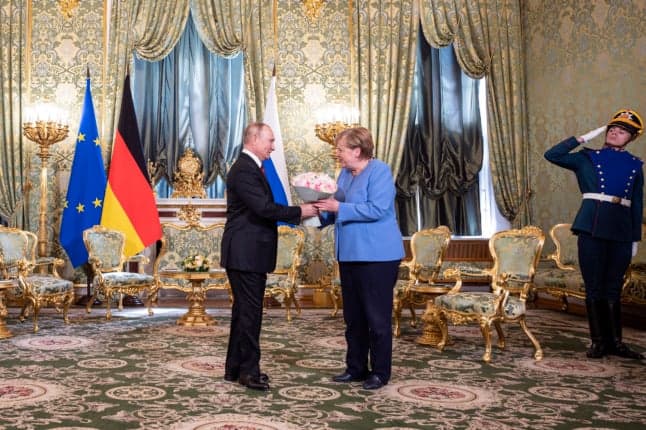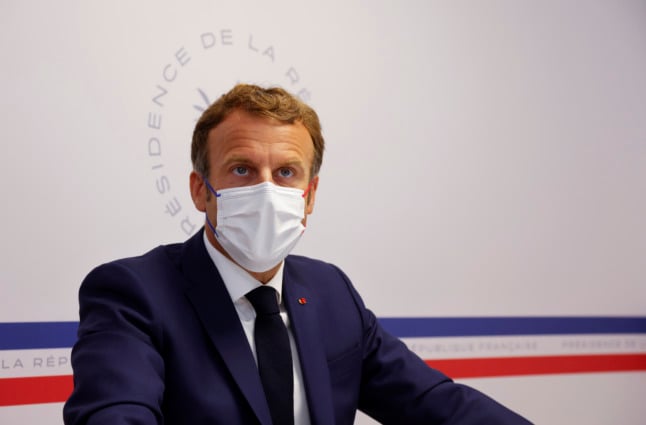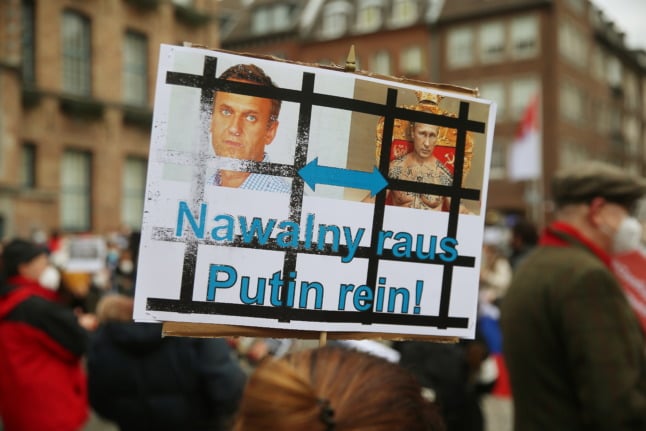Merkel: Russia and Germany should talk despite 'deep differences'

German Chancellor Angela Merkel told Russia's Vladimir Putin that Moscow and Berlin should talk despite "deep differences", in her final working visit to Russia before stepping down as leader next month.
Merkel's trip to Moscow coincides with the anniversary of a nerve-agent attack on now-jailed opposition leader Alexei Navalny, whose life was saved by Berlin doctors.
Her aides have made clear that the timing of the meeting is not accidental.
"Even if we have deep disagreements, we are talking to one another and it should stay that way," Merkel told Putin in a televised exchange before the talks at the Kremlin.
"We have a lot to talk about," she added, naming several issues on their agenda, including the Taliban takeover of Afghanistan.
They are also expected to discuss the simmering conflict in eastern Ukraine and the authoritarian crackdown in Russia-allied Belarus.
Putin greeted Merkel with flowers, a gesture he reserves for female leaders, and said he hoped the visit will not only be a "farewell" one, but a "serious one".
READ ALSO: End of an era: Merkel to meet Putin in final state visit to Russia
Merkel, who will bow out of politics following German elections on September 26th, did not mention Navalny in her opening comments.
She has blamed the attack on the Kremlin after tests in European laboratories showed Navalny was poisoned using the Novichok chemical weapon, and has called for his release. Putin denies any involvement.
Merkel's spokesman Steffen Seibert said the attack had put a "heavy burden" on relations between the two countries.
"Our demands have still not been met," Seibert said earlier this week, adding that the case was still "unresolved".

French President Emmanuel Macron has called on Putin to release Navalny. Photo: picture alliance/dpa/Reuters Pool/AP | Eric Gaillard
French President Emmanuel Macron called on Putin to release Navalny on the eve of Merkel's visit in a phone call with the Russian leader, according to the Elysee.
READ ALSO: Russia accuses Germany of refusing to cooperate on Navalny medical probe
The chancellor will travel to Russia's rival Ukraine after visiting the Kremlin chief, who infrequently receives Western visitors in Moscow.
Merkel, who grew up in communist East Germany, and Putin, a former KGB agent stationed there, speak each other's languages.
During the chancellor's 16 years in power, the pair always kept a dialogue despite strained relations, dampened by issues ranging from alleged cyberattacks to the conflicts in Ukraine and Syria.
'Wrongly' imprisoned
Merkel visited Navalny when he was treated at the Charité hospital in Berlin following the near-fatal poisoning.
Navalny is now being held in a maximum security prison colony in Pokrov, 100 kilometres (60 miles) east of Moscow.
READ ALSO: Sweden, Germany and Poland throw out Russian diplomats in row over Navalny protest
This month he was charged with new crimes that could prolong his jail time by three years. If found guilty, he could only be released after 2024, the year Russia is scheduled to hold a presidential election.
Seibert said Navalny had been "wrongly" imprisoned.
In a message from prison posted on his Instagram by his team Friday, Navalny said the 20th of August -- when he thought "he died" after losing consciousness on a flight over Siberia -- was his "second birthday".
He thanked his supporters for calling for him to be taken out of Russia for treatment.
"Thanks to you I survived and landed in prison," he joked, adding "sorry, I could not help myself".

A demonstrator in Düsseldorf holds a sign saying "Navalny out, Putin in" in protest against the imprisonment of the Russian anti-corruption activist. Photo: picture alliance/dpa | David Young
Amnesty International called Navalny's poisoning an "outrageous crime" that Russia should have urgently investigated.
"Instead, the Russian government chose to throw Navalny behind bars on false grounds," it said in a statement on Friday.
The 45-year-old's movement has faced unprecedented pressure ahead of September parliamentary polls in Russia, in which Putin's United Russia party is expected to struggle.
READ ALSO: Germany warns Russia it will ‘defend itself’ against targeted disinformation in election year
Navalny has called on Russians from prison to sabotage the September election with his strategy of "Smart Voting", that encourages voters to back candidates best placed to defeat Kremlin-linked politicians.
The German leader is expected to meet Ukrainian President Volodymyr Zelensky Sunday, as tensions continue over Moscow's troop build-up on Ukraine's borders.
Germany has been a major player in efforts to broker peace in eastern Ukraine.
Merkel may also seek to provide Ukraine with assurances over Nord Stream 2, the controversial gas pipeline set to double natural gas supplies from Russia to Germany.
Comments
See Also
Merkel's trip to Moscow coincides with the anniversary of a nerve-agent attack on now-jailed opposition leader Alexei Navalny, whose life was saved by Berlin doctors.
Her aides have made clear that the timing of the meeting is not accidental.
"Even if we have deep disagreements, we are talking to one another and it should stay that way," Merkel told Putin in a televised exchange before the talks at the Kremlin.
"We have a lot to talk about," she added, naming several issues on their agenda, including the Taliban takeover of Afghanistan.
They are also expected to discuss the simmering conflict in eastern Ukraine and the authoritarian crackdown in Russia-allied Belarus.
Putin greeted Merkel with flowers, a gesture he reserves for female leaders, and said he hoped the visit will not only be a "farewell" one, but a "serious one".
READ ALSO: End of an era: Merkel to meet Putin in final state visit to Russia
Merkel, who will bow out of politics following German elections on September 26th, did not mention Navalny in her opening comments.
She has blamed the attack on the Kremlin after tests in European laboratories showed Navalny was poisoned using the Novichok chemical weapon, and has called for his release. Putin denies any involvement.
Merkel's spokesman Steffen Seibert said the attack had put a "heavy burden" on relations between the two countries.
"Our demands have still not been met," Seibert said earlier this week, adding that the case was still "unresolved".

French President Emmanuel Macron has called on Putin to release Navalny. Photo: picture alliance/dpa/Reuters Pool/AP | Eric Gaillard
French President Emmanuel Macron called on Putin to release Navalny on the eve of Merkel's visit in a phone call with the Russian leader, according to the Elysee.
READ ALSO: Russia accuses Germany of refusing to cooperate on Navalny medical probe
The chancellor will travel to Russia's rival Ukraine after visiting the Kremlin chief, who infrequently receives Western visitors in Moscow.
Merkel, who grew up in communist East Germany, and Putin, a former KGB agent stationed there, speak each other's languages.
During the chancellor's 16 years in power, the pair always kept a dialogue despite strained relations, dampened by issues ranging from alleged cyberattacks to the conflicts in Ukraine and Syria.
'Wrongly' imprisoned
Merkel visited Navalny when he was treated at the Charité hospital in Berlin following the near-fatal poisoning.
Navalny is now being held in a maximum security prison colony in Pokrov, 100 kilometres (60 miles) east of Moscow.
READ ALSO: Sweden, Germany and Poland throw out Russian diplomats in row over Navalny protest
This month he was charged with new crimes that could prolong his jail time by three years. If found guilty, he could only be released after 2024, the year Russia is scheduled to hold a presidential election.
Seibert said Navalny had been "wrongly" imprisoned.
In a message from prison posted on his Instagram by his team Friday, Navalny said the 20th of August -- when he thought "he died" after losing consciousness on a flight over Siberia -- was his "second birthday".
He thanked his supporters for calling for him to be taken out of Russia for treatment.
"Thanks to you I survived and landed in prison," he joked, adding "sorry, I could not help myself".

A demonstrator in Düsseldorf holds a sign saying "Navalny out, Putin in" in protest against the imprisonment of the Russian anti-corruption activist. Photo: picture alliance/dpa | David Young
Amnesty International called Navalny's poisoning an "outrageous crime" that Russia should have urgently investigated.
"Instead, the Russian government chose to throw Navalny behind bars on false grounds," it said in a statement on Friday.
The 45-year-old's movement has faced unprecedented pressure ahead of September parliamentary polls in Russia, in which Putin's United Russia party is expected to struggle.
READ ALSO: Germany warns Russia it will ‘defend itself’ against targeted disinformation in election year
Navalny has called on Russians from prison to sabotage the September election with his strategy of "Smart Voting", that encourages voters to back candidates best placed to defeat Kremlin-linked politicians.
The German leader is expected to meet Ukrainian President Volodymyr Zelensky Sunday, as tensions continue over Moscow's troop build-up on Ukraine's borders.
Germany has been a major player in efforts to broker peace in eastern Ukraine.
Merkel may also seek to provide Ukraine with assurances over Nord Stream 2, the controversial gas pipeline set to double natural gas supplies from Russia to Germany.
Join the conversation in our comments section below. Share your own views and experience and if you have a question or suggestion for our journalists then email us at [email protected].
Please keep comments civil, constructive and on topic – and make sure to read our terms of use before getting involved.
Please log in here to leave a comment.